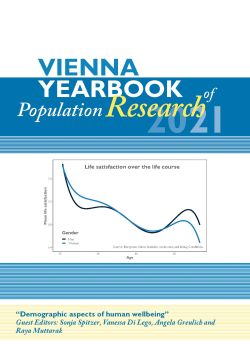
Vienna Yearbook of Population Research 2021, pp. 417-466, 2021/07/20
Demographic Aspects of Human Wellbeing

This paper identifies subjective well-being trajectories through happiness measures as influenced by time, socio-economic, demographic and behavioural determinants. Hierarchical age-period-cohort models are applied to European Social Survey (2002–2016) data on the population aged 30 and older in 10 countries. A U-shaped relationship between age and happiness is found for some countries, but a rather flat pattern and considerable diversity beyond age 80 are detected for other countries. Lower happiness levels are found for baby boomers (1945–1964) than for preboomers and post-boomers, and also for late boomers (1955–1964) than for early boomers (1945–1954). Women, highly educated and native people are shown to have higher happiness levels than men, less educated and non-native people, respectively. Moreover, a positive assessment of income, having a partner, and being a parent, in good health, employed and socially active are all found to have a positive impact on happiness levels. We find evidence of gaps in happiness levels due to differences in socio-economic characteristics over the life course in some, but not in all of the countries analysed.
Keywords: subjective well-being; social inequalities; generations; healthy ageing